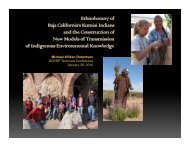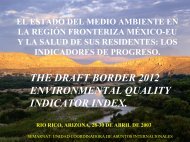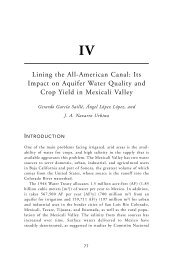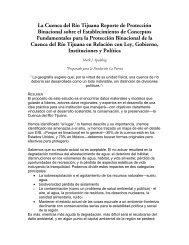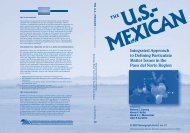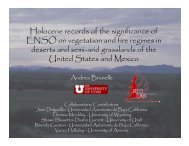Entire Book - Southwest Consortium for Environmental Research ...
Entire Book - Southwest Consortium for Environmental Research ...
Entire Book - Southwest Consortium for Environmental Research ...
You also want an ePaper? Increase the reach of your titles
YUMPU automatically turns print PDFs into web optimized ePapers that Google loves.
Improving Transboundary Air Quality with<br />
Binational Emission Reduction Credit Trading<br />
• Should emission banking be allowed? Doing so provides<br />
incentives <strong>for</strong> early abatement ef<strong>for</strong>ts but may also result in<br />
temporal hot spots.<br />
• Is emissions trading to be organized as a cap-and-trade system<br />
or should a baseline-and-trade system be implemented? Indeed,<br />
in the absence of strict en<strong>for</strong>cement of air quality standards in<br />
Mexico, is a cap-and-trade program even possible?<br />
• How are permits to be distributed initially? Are emissions<br />
grandfathered or should permits be auctioned by the government?<br />
• How exactly is the exchange of emission permits to take place?<br />
Will there be an organized exchange? Will the government or<br />
the private sector serve as a central clearinghouse?<br />
• How are emission reductions certified and who does the certification?<br />
Should government authorities certify them or<br />
should private environmental auditors be used?<br />
• Can permits be purchased by third parties and retired from<br />
use? Allowing this will result in better air quality, but it will<br />
also increase the cost of offsets, thereby reducing economic<br />
activity. The result could be greater unemployment.<br />
All of these questions are controversial and different commentators<br />
have come to different conclusions, but in nearly every case the<br />
controversy is made more complicated by the existence of an international<br />
border. For example, take the issue of en<strong>for</strong>cement of air<br />
quality standards. In the United States, air quality standards are set<br />
by the national government, specifically EPA, but how those standards<br />
are to be met is determined by state governments, each of<br />
which submits a State Implementation Plan (SIP) and also occasionally<br />
augments air quality standards. Many of these SIPs already use<br />
emissions trading as a tool <strong>for</strong> achieving environmental goals. In<br />
Mexico, both air quality standards and the methods by which these<br />
standards are to be met are set by the national government.<br />
In some cases, these issues can be resolved by unilateral action by<br />
one government or the other; in other cases, international cooperation<br />
is required. Much of the remainder of this volume will discuss<br />
how to resolve the issues outlined above to promote the establishment<br />
of active emissions trading along the U.S.-Mexican border.<br />
20




